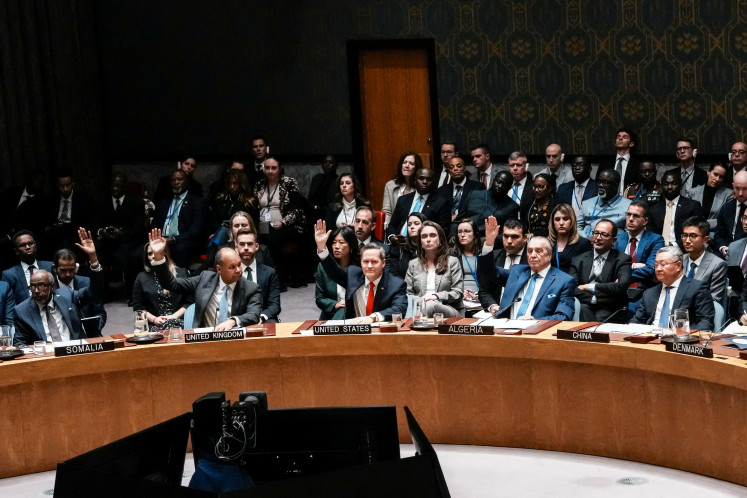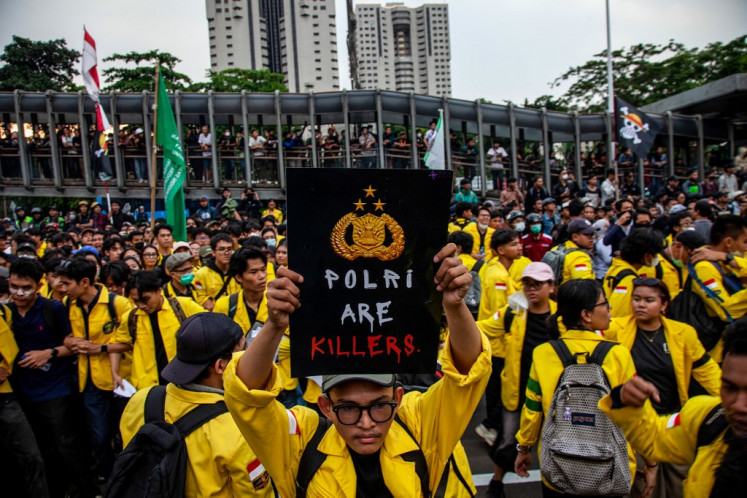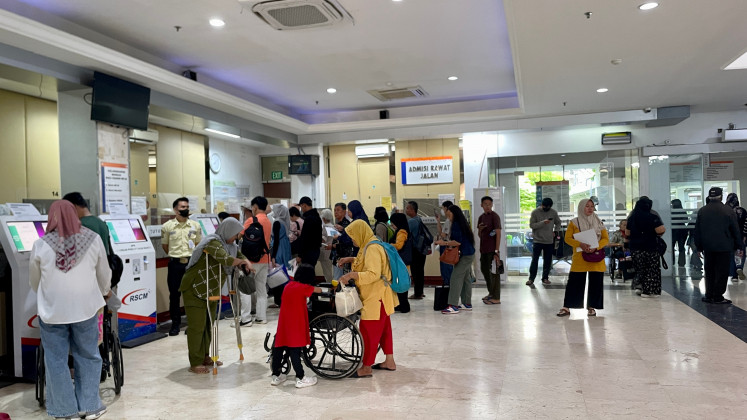Popular Reads
Top Results
Can't find what you're looking for?
View all search resultsPopular Reads
Top Results
Can't find what you're looking for?
View all search resultsBernice Chauly: Her love-hate conundrum with Malaysia
BERNICE CHAULY: (JP/Prodita Sabarini) Malaysian multi-talented artist Bernice Chauly loathes and loves her country at the same time
Change text size
Gift Premium Articles
to Anyone
BERNICE CHAULY: (JP/Prodita Sabarini)
Malaysian multi-talented artist Bernice Chauly loathes and loves her country at the same time. She says she loves her home country but she is also toying with the idea of moving to Bali.
In Ubud, Bali, she told The Jakarta Post: "I thought of moving to Bali. But it's not that easy. It would need a leap of faith." She was in the Island of the Gods for the Ubud Writers and Readers Festival last month.
Being a single mother of two daughters, her children come first when considering moving to another country.
"It's an exciting time (being in Malaysia). It's a really frustrating time as well. I'm not going to leave. If I leave it must be for a good reason. I love my country, it's my home," she said while sitting in an antique wooden Balinese chair in one of Ubud's resorts.
She looked beautiful in a simple elegant black tunic dress. She wore thick-rimmed glasses that gave her a slightly nerdy character, her straight, long black hair tied behind her head.
This year she published her second collection of poems, The Book of Sins, independently. Her first one, Going There and Coming Back, was published in 1997.
Chauly is an actor, filmmaker, photographer, writer, lecturer but foremost a poet. She is also one of the many Kuala Lumpur-based talented artists struggling to create works of art in an unsupportive atmosphere under an authoritarian government.
Malaysia has some of the toughest censorship laws in the world. The authorities exert substantial control over the media and can impose restrictions in the name of national security.
"I have a love-hate relationship with my country. It's a great country but I think our politicians are running it into the ground and creating a lot of stress and turmoil for people such as myself who want to continue to live, work and create (works of art) in Malaysia. But it's becoming really really hard, because you have a sense of frustration that things are just not going to get better," she said.
"The situation in Malaysia is very bad, very uncertain. There's no bloodshed but it's brewing. All it would take is one small stupid incident to ignite some sort of riot. A lot of racial tension has been building since the election.
"I don't want to sound like a prophet of doom, but things are really really bad. I'm really worried about the future of Malaysia. It's very worrying and I think people are trying to downplay it as much as they can."
Malaysian politics have been in turmoil this year. The March election shook five decades of status quo with voters shifting from the ruling Barisan Nasional coalition parties to opposition parties.
Meanwhile, racial tensions have caused minority groups in the multiethnic and multireligious country to rally against discrimination. Ethnic Malays comprise some 60 percent of the population. The Chinese constitute around 26 percent, while Indians and other nationalities make up the rest.
In November last year about 5,000 ethnic Indians held a rare rally organized by the Hindu Rights Action Force (Hindraf); a larger one with some 10,000 protesters occurred in Febr. 2008. The Malaysian government banned Hindraf in mid-October. The state also jailed vocal anti-government blogger Raja Petra Kamaruddin in September.
The authoritarian quality of the rulers has made some artists leave the country.
"A lot of people are leaving. A lot of artists, a lot of people with great talent in this country, because they don't want to live under that (repression)," she said.
For others who have stayed, they must find creative ways to produce art that, at the same time, does not betray their idealism.
For Chauly, it is by using English. She uses English in her daily life. Her poems and prose are mostly in English, with one or two written in Malay.
Born from a Punjabi father and a Chinese mother, English is her first language. But that is not the only reason she uses the language. According to her, writing in English in Malaysia is somewhat safer.
"Just in terms of the ratio, English-speaking Malaysians and English-reading Malaysians are a very small minority. When you write in Malay you're appealing to a very large cross section of Malaysian society and if you're saying something that is subversive and politically offensive or slightly provocative then you're in trouble. And the police will investigate you.
"But if you write in English, you know (that) they don't really care. As long as it's not too offensive and it's not too overtly political and provocative, it's actually still OK. It's allowed."
She said that her book, The Book of Sins was not subversive in a political way but that it was too personal. "Too personal can be very subversive. You don't talk about yourself in Malaysia. My poems are very very personal, almost to the point of being subversive."
The Book of Sins deals with issues of relationships, love, identity and motherhood.
She is currently writing a memoir she began 20 years ago, which will take shape in different genres. "It can be a play. It can be a novel. A series of a memoir. A series of vignettes. But it's one complete family story."
Chauly said that her memoir was an attempt to voice her complexity. Her late father was born Hindu and her late mother Buddhist. They raised her a Catholic.
"I'm Malaysian but I'm not Malay. I'm Muslim by virtue of conversion for my ex-husband. It's really complicated. Now that I'm divorced I still have to remain a Muslim. If I want to marry again, I have to marry a Muslim. It's a very strange situation."
She said that her memoir-in-progress was also an attempt to address a certain sense of place.
That is "because Malaysians are very confused".










